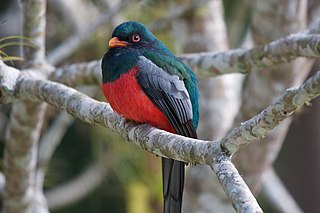
The Guianan trogon, is a near passerine bird in the trogon and quetzal family Trogonidae. It is found in Brazil, French Guiana, Guyana, Suriname, Trinidad, and Venezuela.

The streaked tuftedcheek is a passerine bird in the Furnariinae subfamily of the ovenbird family Furnariidae. It is found in Bolivia, Colombia, Ecuador, Peru, and Venezuela.

The slaty-tailed trogon is a near passerine bird in the family Trogonidae, the quetzals and trogons. It is found in Mexico, throughout Central America, and in Colombia and Ecuador.

The Amazonian black-throated trogon is a bird in the family Trogonidae, the trogons and quetzals. Although it has also been called "yellow-bellied trogon" it is not the only trogon with a yellow belly. It is found in every mainland South American country except Argentina, Chile, Paraguay, and Uruguay.

The chestnut-backed antbird is a passerine bird in subfamily Thamnophilinae of family Thamnophilidae, the "typical antbirds". It is found in Colombia, Costa Rica, Ecuador, Honduras, Nicaragua, and Panama.

The Choco toucan is a near-passerine bird in the family Ramphastidae, the toucans, toucanets, and aracaris. It is found in Colombia and Ecuador.

The pearly-breasted cuckoo is a species of bird in the tribe Phaenicophaeini, subfamily Cuculinae of the cuckoo family Cuculidae. It is found in Argentina, Bolivia, Brazil, Ecuador, French Guiana, Guyana, Paraguay, Suriname, Venezuela, and possibly Colombia and Panama.

The black-crested tit-tyrant or Marañón tit-tyrant is a species of bird in subfamily Elaeniinae of family Tyrannidae, the tyrant flycatchers. It is found in Ecuador and Peru.

The white-throated tyrannulet is a species of bird in subfamily Elaeniinae of family Tyrannidae, the tyrant flycatchers. It is found in Argentina, Bolivia, Brazil, Colombia, Ecuador, Peru, and Venezuela.

The wing-banded antbird is a species of passerine bird in subfamily Myrmornithinae of family Thamnophilidae, the "typical antbirds". It is found in Brazil, Colombia, Ecuador, French Guiana, Guyana, Nicaragua, Panama, Peru, Suriname, and Venezuela.

The rufous-backed stipplethroat is a species of bird in subfamily Thamnophilinae of family Thamnophilidae, the "typical antbirds". It is found in Brazil, Colombia, Ecuador, Peru, and Venezuela. In its complex taxonomic history, Epinecrophylla haematonota has also been called the rufous-backed antwren, stipple-throated antwren, Napo stipple-throated antwren, and western stipple-throated antwren.

The collared antshrike is a species of bird in subfamily Thamnophilinae of family Thamnophilidae, the "typical antbirds". It is found in Ecuador and Peru.

The grey-throated leaftosser is a Near Threatened species of bird in the subfamily Sclerurinae, the leaftossers and miners, of the ovenbird family Furnariidae. It is found in Bolivia, Brazil, Colombia, Costa Rica, Ecuador, Panama, Peru, Trinidad and Tobago, and Venezuela.

The spectacled prickletail is a species of bird in the Furnariinae subfamily of the ovenbird family Furnariidae. It is found in Colombia, Ecuador, and Peru.

The Andean flicker is a species of bird in subfamily Picinae of the woodpecker family Picidae. It is found in Argentina, Bolivia, Chile, Ecuador, and Peru.

The Chocó trogon, also known as the white-eyed trogon or blue-tailed trogon, is a species of bird in the family Trogonidae, the quetzals and trogons. It is found in Colombia and Ecuador.

The gartered trogon, also known as the northern violaceous trogon, is a bird in the family Trogonidae, the quetzals and trogons. It is found in Mexico, all of Central America, and Colombia, Ecuador, Peru, and Venezuela.

The Amazonian trogon, is a species of bird in the family Trogonidae, the trogons and quetzals. It is found in Bolivia, Brazil, Colombia, Ecuador, Peru, and Venezuela.

The northern black-throated trogon, also known as the graceful black-throated trogon, is a bird in the family Trogonidae, the trogons and quetzals. It is found from southeastern Honduras to northwestern Colombia.

The Atlantic black-throated trogon is a bird in the family Trogonidae, the trogons and quetzals. It is found in Argentina, Brazil, and Paraguay.






















